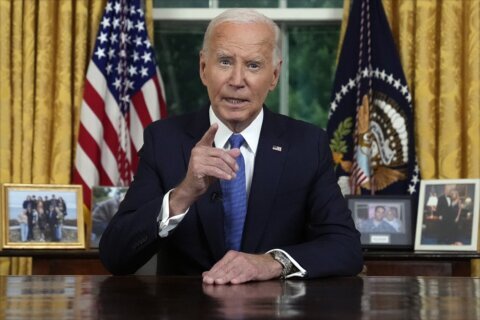The 2024 White House campaign has thrust a handful of governors and senators into the mix for vice president, and that has drawn attention to rules of succession in the contenders’ home states should they win.
Each state has its own rules for naming replacements when elected officials leave office. Those rules carry significant political stakes in a year when former President Donald Trump has already selected Ohio Sen. JD Vance as his running mate and Vice President Kamala Harris considers her own choice for the No. 2 spot on the ticket.
Here are the rules in some states that have VP contenders:
Pennsylvania
If Harris picks Gov. Josh Shapiro, he can remain in office as governor while he campaigns for vice president. If he ultimately were elected, Shapiro would have to resign as governor before the Jan. 20, 2025, inauguration.
Shapiro, 51, is in his second year as governor.
Constitutionally, Democratic Lt. Gov. Austin Davis would be tapped to serve the remainder of Shapiro’s four-year term, which ends in January 2027. Davis ran on the 2022 general election ticket with Shapiro after Shapiro endorsed him in a separate primary for the lieutenant governor’s office.
Davis, 34, would become the youngest governor in the country and the first Black governor of Pennsylvania, as well as its second-youngest ever. He is already the youngest lieutenant governor in the nation and the first Black lieutenant governor in Pennsylvania.
A new governor would be elected in the November 2026 election.
Ohio
If Vance is elected, Republican Gov. Mike DeWine would have the job of appointing his replacement.
His appointee would serve from Inauguration Day until Dec. 15, 2026, under state law. A special election for the last two years of Vance’s six-year term would be held in November 2026.
DeWine has said he would pick someone who would work hard for Ohio and also be capable of running — and winning — in 2026.
The race for the next full six-year term would take place in 2028.
A Senate vacancy would present DeWine with the opportunity to alleviate a bottleneck at the top of the political pecking order of aspiring Ohio Republicans.
Lt. Gov. Jon Husted and Attorney General Dave Yost are already positioning to face off in a 2026 gubernatorial primary, and three other sitting statewide officeholders who are Republicans face 2026 term limits and are weighing their futures. Also, Cleveland businessman Bernie Moreno is running this fall for Ohio’s other Senate seat against incumbent Sen. Sherrod Brown.
North Carolina
Gov. Roy Cooper already must leave his current job in January because the state constitution limits him to two consecutive four-year terms. He is one of the many governors on Harris’ short list.
Another constitutional provision offers the potential for Cooper’s out-of-state campaign travels as a Harris running mate to complicate matters back home.
The constitution says that “during the absence of the Governor from the State … the Lieutenant Governor shall be Acting Governor.”
The current lieutenant governor, who is elected separately from the governor, is Republican Mark Robinson. Robinson is running for governor against Democratic Attorney General Josh Stein, and the provision could help Robinson carry out favored policy choices during the final weeks of his campaign.
But could Robinson replace significant Cooper policies permanently? That’s highly unlikely, one political expert said, based on the governor’s previous travel history and modern transportation and communications.
The idea is “almost like a fun parlor game,” said Chris Cooper, a Western Carolina University political science professor unrelated to the governor. “It’s a quirky part of our state constitution, but in terms of public policy it’s just not going to be meaningful.”
If Robinson issued an executive order that Roy Cooper didn’t like, the governor could just undo it when he returned, Chris Cooper said.
And while the GOP-controlled General Assembly could convene in Cooper’s absence and pass a bill that Robinson could quickly sign, Republicans already have veto-proof majorities to enact bills largely whenever they choose.
Kentucky
Democratic Gov. Andy Beshear has raised his national profile by winning a second term last year in heavily Republican Kentucky.
Democratic Lt. Gov. Jacqueline Coleman would take Beshear’s place in Kentucky should the governor resign to become vice president. She would serve out the remainder of his term, which ends in late 2027, and could run for a full term in that year’s election. Beshear and Coleman ran as a ticket in their successful campaigns in 2019 and 2023.
There is debate within Kentucky political circles about Coleman’s ability to appoint a successor as lieutenant governor. It’s an “open question” because Kentucky’s constitution “doesn’t address the issue specifically,” says University of Kentucky law professor Joshua A. Douglas.
This isn’t the first time that Kentucky’s succession rules have come under scrutiny. Republican lawmakers this spring passed a measure to have a vacant U.S. Senate seat filled by a special election, overriding Beshear’s veto. The bill removed the governor from a role in filling a vacancy. It came amid heightened scrutiny about the health of Kentucky’s senior senator, Republican leader Mitch McConnell, though bill supporters said it was unrelated.
Arizona
As he is looked at as a possible Democratic VP contender, Sen. Mark Kelly is no stranger to Arizona’s process for replacing candidates. He won a special election in 2020 for John McCain’s old seat.
If the former astronaut is chosen as vice president, Democratic Arizona Gov. Kate Hobbs would have to appoint a replacement from the same party as Kelly. That person would serve until a special election in 2026 to fill the last two years of Kelly’s term.
In December 2018, Republican Arizona Gov. Doug Ducey appointed Republican then-Rep. Martha McSally to the McCain seat, which had been filled for a few months after McCain’s death by GOP Sen. Jon Kyl.
In an example of how a Senate seat can eventually change party control, Kelly beat McSally during a 2020 special election that was considered among the most competitive Senate races in the country that year. Kelly went on to be reelected in November 2022.
___
Associated Press Writers Bruce Schreiner, Gary D. Robertson, Marc Levy, Julie Carr Smyth and Jonathan J. Cooper contributed to this report.
Copyright © 2024 The Associated Press. All rights reserved. This material may not be published, broadcast, written or redistributed.







